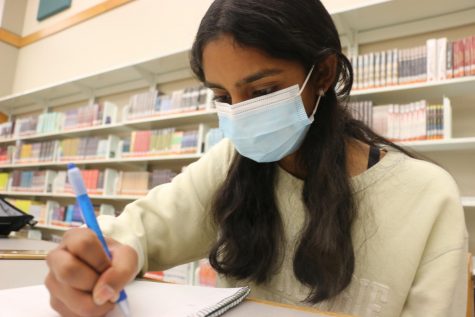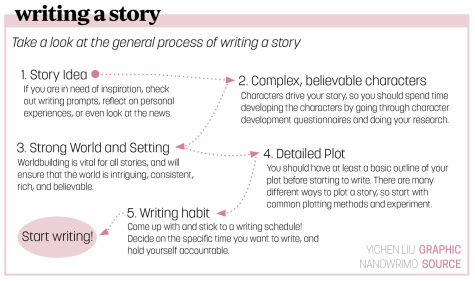Anin Nagajothi, novel writer and sophomore, sits in front of her computer after a tiring school day, but she feels relaxed, calm and totally free. That is because the best assignment of her day has just begun—to write.

Nagajothi said she loves to write in her free time, or whenever she’s had a stressful day because it acts as a release for her day.
Nagajothi said, “It’s just like reading a book and escaping to that reality, except it’s your own world with your own characters. You’re basically going to a place where you are in control of what happens next.”
Nagajothi said creative writing was completely different from a school writing assignment because there were fewer guidelines and regulations.
“You’re writing for yourself, not for an assignment or something else, so you’re able to have more fun with the story and plot lines,” she said. “And you’re also a lot less stressed since you don’t have a deadline.”
Nagajothi is one of many who use creative writing as an outlet for traditional stressors. With National Novel Writing Month (NaNoWriMo) in November, millions of people globally take part in writing novels and short stories as a fun, creative assignment.
Creative writing teacher Mary Halfmann said she encourages those students interested in writing to submit their writings for competitions.
Halfmann said, “I think it’s just a matter of putting yourself out there. I know Scholastic (Art and Writing Awards) always has competitions. (Competing) gives you exposure. You have nothing to lose by entering a contest but everything to gain.”
Laura Martens, winner of the Guilded Leaf Teen Writing Contest and junior, agreed. “I’ve done writing competitions, definitely…I do think it’s valuable for writers to have people who are close to them reading their stuff, but also complete strangers; I think it’s good to have an even mix,” she said, adding that she will be entering into the 2021 Scholastic Art and Writing Awards as well.
Along these lines, junior Nolan Latterell said he submits works of poetry and short stories for fun.
“I haven’t written anything that has been officially published,” he said. “For the most part I write in the fantasy and sci-fi genres. I’d say that I write as a way of bringing the worlds in my head to life.”
Halfmann also said writing was a great outlet for creativity in students and has seen it in her creative writing class and club.
“(My students) get on the board and they work,” Halfmann said. “(One time) they were all on a Google Doc and they were all changing a story and there was so much energy. That was so rewarding. That is what it’s all about.”
Halfmann said creative writing gave the students a community in addition to being an outlet.
“In the creative writing class you form a community like you don’t in other classes, so a lot of our current students or former students have joined the creative writing club where they can write and they can come up with ideas,” she said.
Martens, who took the creative writing class in her freshman year and is currently a member of the Creating Writing Club and Just Write Club at CHS, agreed with this sentiment. She said, “I’d been doing a lot of writing on my own but there’s something about having a teacher who’s a writer and having classmates who are writers where you can get feedback from people. I think [the reason I took it] was definitely the community aspect of having other people review your writing, give you feedback, motivate you to write because you’re with a group of people who are also doing it.”
Nagajothi, who wrote her novel with her cousin, said she experienced what it was like to write with a peer instead of individually, like in normal class. She said writing with friends and writing in general both helped improve her mental health.
“Writing this book has boosted my creativity a lot. When (my cousin and I) had writer’s block, we had to think of the plot line we were going with and how we would continue it. And my mental health got better when I wrote (my novel) because I was basically going to my own reality whenever I set out to write more of it.”
The benefits Nagajothi said she has gained from creative writing are replicated around the world on a daily basis. According to the Research Gate, writers everywhere use creative writing as a way to improve their mental health.
The Research Gate website states, “The cognitive‐behavioural bases of ‘writing therapy’ include the informative function of emotions, self‐regulation, re‐framing and dealing more effectively with negative feelings.”
Both Halfmann and Latterell said they enjoyed the out-of-world experience writing a story or poem gave the writer. Latterell said with his poetry he could portray actions that could never happen in the real world.
He said, “I write stories to bring worlds and ideas to life that no one has before because if I don’t, then they’ll never be anything more than a fantastical imagination in my head.”
Halfmann said she emphasized the importance of writing for others and for herself. She

said reading books and keeping a diary were great first steps to becoming a writer and writing something to be proud of.
She said, “(To write you need to) not look at our world as you usually do. You need to think of the different possibilities from the different perspectives and then your whole world opens up. That’s how you start. You just look at something differently and then you write and that’s how it goes.”
Halfmann said she has used her own advice to write excerpts and other creative writing, along with teaching the class she does today. She said after she received a Lilly Teacher Creativity Grant in 2017 she took several writing classes, giving her more writing ideas and experience.
“The bad thing about teaching is I don’t have enough time (to write) and in the summer I’m catching up on (schoolwork) I couldn’t finish during the school year, but I do have ideas and some short pieces I’ve written. I’m always writing and I’m always composing in my head (because) my head is never quiet, and that’s where a lot of writing occurs. So I’m a work in progress,” she said with a smile.
Nagajothi said she started writing the same way Halfmann did, writing short stories as a time pass until she finally got so used to it she wrote a whole novel.
“It was a nice way to get my mind off of things,” she said. “Especially during quarantine, it was a great (way to pass time).”
Overall Nagajothi said writing helped boost herself in many ways. She said she encouraged everyone to try and write, especially during the summer when people tend to have more time.
“I do think people should write their own stories,” Nagajothi said. “(My cousin and I) love books like Harry Potter and Throne of Glass which have their own fantasy realms, and we wanted to make our own realm or world. If you’re writing for yourself it can really help you escape your reality.”































![What happened to theater etiquette? [opinion]](https://hilite.org/wp-content/uploads/2025/04/Entertainment-Perspective-Cover-1200x471.jpg)














































![Review: “The Immortal Soul Salvage Yard:” A criminally underrated poetry collection [MUSE]](https://hilite.org/wp-content/uploads/2025/03/71cju6TvqmL._AC_UF10001000_QL80_.jpg)
![Review: "Dog Man" is Unapologetically Chaotic [MUSE]](https://hilite.org/wp-content/uploads/2025/03/dogman-1200x700.jpg)
![Review: "Ne Zha 2": The WeChat family reunion I didn’t know I needed [MUSE]](https://hilite.org/wp-content/uploads/2025/03/unnamed-4.png)
![Review in Print: Maripaz Villar brings a delightfully unique style to the world of WEBTOON [MUSE]](https://hilite.org/wp-content/uploads/2023/12/maripazcover-1200x960.jpg)
![Review: “The Sword of Kaigen” is a masterpiece [MUSE]](https://hilite.org/wp-content/uploads/2023/11/Screenshot-2023-11-26-201051.png)
![Review: Gateron Oil Kings, great linear switches, okay price [MUSE]](https://hilite.org/wp-content/uploads/2023/11/Screenshot-2023-11-26-200553.png)
![Review: “A Haunting in Venice” is a significant improvement from other Agatha Christie adaptations [MUSE]](https://hilite.org/wp-content/uploads/2023/11/e7ee2938a6d422669771bce6d8088521.jpg)
![Review: A Thanksgiving story from elementary school, still just as interesting [MUSE]](https://hilite.org/wp-content/uploads/2023/11/Screenshot-2023-11-26-195514-987x1200.png)
![Review: "When I Fly Towards You", cute, uplifting youth drama [MUSE]](https://hilite.org/wp-content/uploads/2023/09/When-I-Fly-Towards-You-Chinese-drama.png)
![Postcards from Muse: Hawaii Travel Diary [MUSE]](https://hilite.org/wp-content/uploads/2023/09/My-project-1-1200x1200.jpg)
![Review: "Ladybug & Cat Noir: The Movie," departure from original show [MUSE]](https://hilite.org/wp-content/uploads/2023/09/Ladybug__Cat_Noir_-_The_Movie_poster.jpg)
![Review in Print: "Hidden Love" is the cute, uplifting drama everyone needs [MUSE]](https://hilite.org/wp-content/uploads/2023/09/hiddenlovecover-e1693597208225-1030x1200.png)
![Review in Print: "Heartstopper" is the heartwarming queer romance we all need [MUSE]](https://hilite.org/wp-content/uploads/2023/08/museheartstoppercover-1200x654.png)


